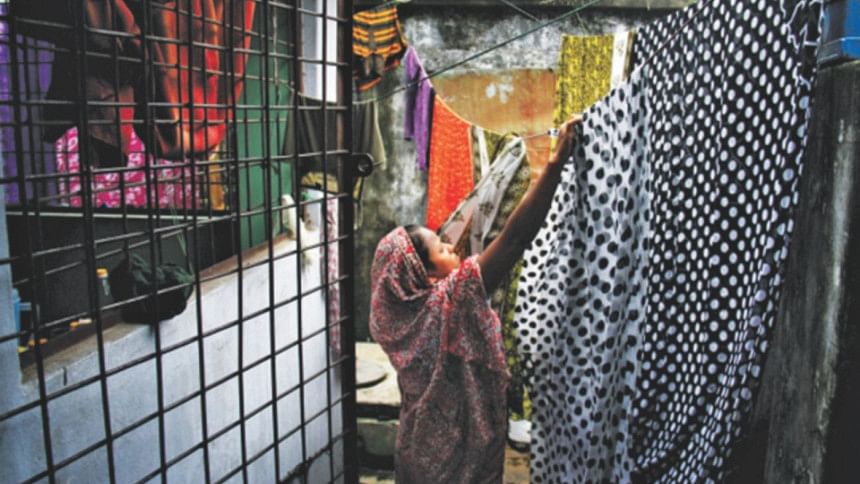A significant milestone

On December 21, 2015, a cabinet meeting chaired by Prime Minister Sheikh Hasina approved the draft Domestic Workers Protection and Welfare Policy 2015. This is a significant milestone in promoting the rights of domestic workers in Bangladesh. One might be curious to know why we need such a policy and how the draft policy has evolved over the years.
Domestic workers are an inevitable part of our daily life, but it is an irony that they are often exposed to various forms of abuses and lack of state recognition as workers. The International Labour Organisation (ILO) estimates that about 100 million people work in domestic households worldwide. About 83 percent of these are women or girls and many are migrant workers. In 2011, the ILO adopted Convention 189 titled "Decent Work for Domestic Workers" and Recommendation No. 201, both of which require countries to take steps to improve working conditions for domestic workers.
The ILO Domestic Workers Convention provides that people who work in domestic households must enjoy the same basic labour rights as other workers. These rights include: reasonable working hours, weekly rest of at least 24 consecutive hours, limits on in-kind payment, clear information on terms and conditions of employment, and respect for fundamental principles and rights at work, including freedom of association and the right to collective bargaining. The Convention also identifies general employment-related issues such as minimum wage, minimum age, protection against violence and harassment, health and safety, the terms and conditions of employment, access to dispute resolution mechanisms, and employment agencies and inspection.
Interestingly, Bangladesh has a very proactive movement demanding legal and policy reforms for the protection of domestic workers. Since 2007, the national trade unions and a group of rights-focused NGOs, under the umbrella of Domestic Workers Rights Network (DWRN), have been working with the Ministry of Labour and Employment, to press for a national policy on domestic workers.
One of the major outcomes of the proactive movement is the Draft Domestic Workers Protection and Welfare Policy 2015, which has been widely debated among DWRN members, and received comments from concerned ministries and various actors at the Tripartite Consultative Committee meetings. The draft domestic workers policy also complies with an existing High Court judgment of 2010, which stresses the inclusion of clearly specified provisions restricting the employment of child domestic workers. The High Court judgement also calls for the registration of domestic workers, decent work conditions, and monitoring of domestic workers employment conditions.
The draft domestic workers policy consists of 16 provisions. These provisions include the rights and duties of domestic workers, their employers, and the government. The introductory part refers to the ground reality on the plight of domestic workers in Bangladesh. It also talks about the existing legal vacuum. It then rationalises the need for a national policy on domestic workers in Bangladesh. Next, it specifies the scope of policy implementation, describes the objectives and goals of the policy, and defines the key terms and the stakeholders under the policy.
The key provisions in the draft policy focuses on some key issues, such as the registration of domestic workers, issuance of identity cards, nature of agreement between the employers and domestic workers or their guardians, the amount and method of payment, the nature and duration of their works, scope of leisure and entertainment for domestic workers, regular training, hospitality, religious freedom and other facilities for them. The draft also discusses taking legal recourses in dealing with human rights abuses and criminal offences either committed by domestic workers or their employers.
The draft policy also specifies the role of the Ministry of Labour and Employment. It calls for a competent government authority to monitor, evaluate, and enforce compliance with the domestic workers' policy. It also recommends more awareness campaigns by the government through the use of media advertisement, leaflet circulation etc.
The draft policy is fairly comprehensive in its coverage of legal and rights protection issues. But there are sceptics who fear its implementation will be difficult. This is certainly not the case. Take for example an NGO-run domestic workers project. For the past few years, the NGO, has been successfully running a pilot project, which demonstrates the feasibility of various provisions in the draft domestic workers policy. It has partnered with employers in securing appointment letters for domestic workers, provided healthcare support from the government's Urban Primary Healthcare project, and brought domestic workers under the lactating pension of the government. It has also managed police registration for domestic workers. All these pilot initiatives have proven beneficial for both the domestic workers and their employers to maintain the standard of working environment.
The pilot project of the NGO is just a representative case. There are many other cases in which employers tend to adopt a more egalitarian attitude to extend financial support to domestic workers and their families, especially during religious holidays. A formal state policy will build on this social capital and best practices.
The cabinet's approval of the domestic workers policy is an outstanding success of our rights groups and their coalition with national trade unions. Now the biggest challenges are implementing the provisions of the policy and bringing domestic workers under the coverage of the national labour law.
The writers are Research Associate (International Affairs), Bangladesh Institute of Law and International Affairs (BILIA) (email: [email protected]), and Research Assistant, Refugee and Migratory Movements Research Unit (RMMRU) (email: [email protected]).

 For all latest news, follow The Daily Star's Google News channel.
For all latest news, follow The Daily Star's Google News channel. 



Comments